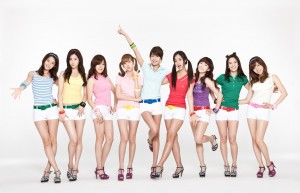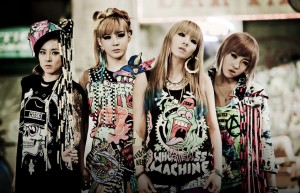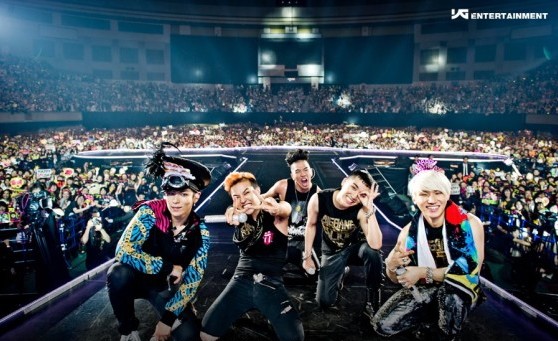 For those of us who have spent a lot of time in the K-pop fandom, it can sometimes be difficult — if not impossible — to recall or imagine how K-pop, and indeed the Korean Wave in general, must look to someone who has had minimal contact with it. Because I’m fortunate to write for Seoulbeats and thus be consistently surrounded by a team of writers and a squadron of readers who are somewhat sympathetic to my obsessive fangirling over SNSD, I can tell you from experience that coming up for air after taking a good long swim in the Korean Wave can be a bit of a shock. When I catch someone side-eyeing my K-popified computer desktop, or get a whole host of bizarre looks after the chorus to “Genie” blares from my cellphone in the library (damn, I thought I put it on vibrate!), I suddenly begin to feel defensive and self-conscious; what must I look like to others? In such a scenario, I pull my sweater tightly around my SNSD t-shirt and pretend to be deeply engrossed in the book I’m reading — which, given that my research focus at graduate school is the Korean Wave, is 9 times out of 10 about Korean pop music. Minus 100 cool points.
For those of us who have spent a lot of time in the K-pop fandom, it can sometimes be difficult — if not impossible — to recall or imagine how K-pop, and indeed the Korean Wave in general, must look to someone who has had minimal contact with it. Because I’m fortunate to write for Seoulbeats and thus be consistently surrounded by a team of writers and a squadron of readers who are somewhat sympathetic to my obsessive fangirling over SNSD, I can tell you from experience that coming up for air after taking a good long swim in the Korean Wave can be a bit of a shock. When I catch someone side-eyeing my K-popified computer desktop, or get a whole host of bizarre looks after the chorus to “Genie” blares from my cellphone in the library (damn, I thought I put it on vibrate!), I suddenly begin to feel defensive and self-conscious; what must I look like to others? In such a scenario, I pull my sweater tightly around my SNSD t-shirt and pretend to be deeply engrossed in the book I’m reading — which, given that my research focus at graduate school is the Korean Wave, is 9 times out of 10 about Korean pop music. Minus 100 cool points.
This is not to say that I’m embarrassed about K-pop, because I’m certainly not. It’s just that I remember very well the cynicism and incredulity with which I first met K-pop in my sophomore year of college. As someone who spent her entire high school career listening to Vanessa Carlton and Michelle Branch (disclaimer: hatin’ is bad), I was completely ready to turn my nose up at the first K-pop video I ever laid eyes on, which happened to be Super Junior‘s nonsensically-titled sophomore hit “Don’t Don!” I mean, what’s with those crazy hair extensions and the guyliner? Why is the red-headed one prettier than I am? Are you sure that these are all guys? Man, this song is weird. Who is Don, and why are they telling him not to do something (80 cool points to you if you somehow understand this horrible pun)?
To put it simply, there’s a bit of a…let’s call it a “learning curve” when it comes to K-pop and the non-Korean listener. Chances are that it is unlike anything we have previously seen or heard before. But once we’ve become hooked, our first memories of WTF-ing over K-pop get a bit fuzzy, and it can be difficult to understand our friends’ obvious bewilderment when we gleefully show them something like this and then wonder why they’re not as excited as we are.
 But as the Korean Wave begins to break, K-pop is starting to earn the attention of Western media outlets, and these media outlets are introducing K-pop to previously unexposed audiences without the explosive “OMG DON’T YOU JUST LOOOOOVE IT” fangirl-tude with which some of us (obviously not me) would approach a non K-pop fan. And one of these magazines is the popular music magazine SPIN, which normally caters to music lovers who — well, let’s just say they probably aren’t jamming out to “Bubble Pop” in their spare time.
But as the Korean Wave begins to break, K-pop is starting to earn the attention of Western media outlets, and these media outlets are introducing K-pop to previously unexposed audiences without the explosive “OMG DON’T YOU JUST LOOOOOVE IT” fangirl-tude with which some of us (obviously not me) would approach a non K-pop fan. And one of these magazines is the popular music magazine SPIN, which normally caters to music lovers who — well, let’s just say they probably aren’t jamming out to “Bubble Pop” in their spare time.
SPIN‘s take on K-pop is not unexpected: it is a stark, realistic picture of the cogs that keep the K-pop machine running. The training lifestyle is remarked on with a note of curious condescension; slave contracts are alluded to, and public denials of their existence are placed on par with public denials of plastic surgery (which pretty clearly indicates how the author feels about them); comparisons are made with American ’90s pop music; that very, very few of the artists participate in any real aspect of music production is noted; and in what had to be a hit-tip to me, my homegurl and secret best friend Tiffany showed up in order to give what I’m sure was a highly edited interview that paints idols as overworked, under-rested, and mistreated robots whose only job is to deliver perfection time and time again. More so than focusing on the music itself, the article chooses to approach K-pop from the perspective of the industry. An unsurprising choice, but one that definitely has implications for how its readers will understand K-pop, as it will color their opinions before they even give it a listen for themselves, should they so choose to do.
I hope I don’t sound as though I bear a grudge against SPIN for reporting honestly about the K-pop music biz; to be honest, I  found myself nodding along as I read. It’s hard to deny that pretty much everything that they say is absolutely and one hundred percent on the money. And believe you me, these sorts of facts about the entertainment industry, which are glaringly absent from most Korean news reports and fan sites, ought to be made public and the industry itself held accountable. In fact, I was actually quite glad that an English-language source that I’ve been familiar with for years was investigating K-pop, because its removal from both South Korea and the industry itself ensured that it would have more creative and journalistic license in choosing how it would represent K-pop.
found myself nodding along as I read. It’s hard to deny that pretty much everything that they say is absolutely and one hundred percent on the money. And believe you me, these sorts of facts about the entertainment industry, which are glaringly absent from most Korean news reports and fan sites, ought to be made public and the industry itself held accountable. In fact, I was actually quite glad that an English-language source that I’ve been familiar with for years was investigating K-pop, because its removal from both South Korea and the industry itself ensured that it would have more creative and journalistic license in choosing how it would represent K-pop.
But here’s where my disappointment kicks in just a little. As a seasoned K-pop fan, I welcome criticism to the K-pop table (and as you all know, I willingly participate in it very often). Yet I can’t help but feeling that criticism is mine to make because I am a seasoned K-pop fan. It’s very easy to dismiss or criticize something you don’t fully know or understand, but it is much more difficult to do so when you’re deeply involved with it. I have no idea how long the author of the SPIN article has been following K-pop, or how much he was briefed on it before he made his trip to Seoul, but I can’t help but feel as though his background information is incomplete or paltry in some way — even if the magazine’s website says that he will continue to report on K-pop in the future.
See, if you don’t know anything about K-pop and just hear about the industry and the process by which both idols and music are manufactured, of course it’s going to sound ridiculous and will likely invite condescension. An industry that enslaves its artists to produce artificial bubble gum pop hits one after the other? And makes guys wear hair extensions and guyliner? Thanks, but no thanks.
But there’s obviously much more to K-pop and the Korean Wave than that; if there weren’t, Seoulbeats likely wouldn’t exist — and you likely wouldn’t be reading the words on this page. Even if one’s initial reaction to K-pop isn’t super positive, it  doesn’t mean that one’s curiosity won’t be in some way piqued, or that one cannot enjoy or consume K-pop in the future. I’m sure that there must be many fans who were less-than-enthused with K-pop when they first encountered it
doesn’t mean that one’s curiosity won’t be in some way piqued, or that one cannot enjoy or consume K-pop in the future. I’m sure that there must be many fans who were less-than-enthused with K-pop when they first encountered it
I suppose I’m just a bit regretful that SPIN‘s take on K-pop will likely turn off anyone previously unacquainted with it from ever giving it a chance — and since K-pop already has a hurdle to overcome with non-Korean/Western audiences, the negative image that SPIN paints will make the task even more difficult. It would have been great if, in the interest of keeping things somewhat objective, the online article had been accompanied by more than just a few side links to other K-pop related articles; the accompaniment of maybe a few links or some embedded videos to give readers the chance to take a listen would have at least made it difficult for people to outright dismiss K-pop without letting it speak for itself. Because yes, the K-pop industry is not always nice, but the whole industry aims to produce music that people will love and keep coming back for. Why not give readers the opportunity to love it, too? That could directly contribute to the cultivation of K-pop fans who approach the genre with a smart attitude, fans who are unafraid to be informed and to criticize, but similarly unafraid to openly declare their love for U-know Yunho and break out “Keep Your Head Down” at their next dance party — all of which will open channels for dialogue and discussion that will enrich not only the K-pop scene in South Korea, but the Korean Wave’s manifestation on foreign shores.
Maybe next time, SPIN.
What do you think, Seoulmates? Did you read the article? If so, how did you react?


